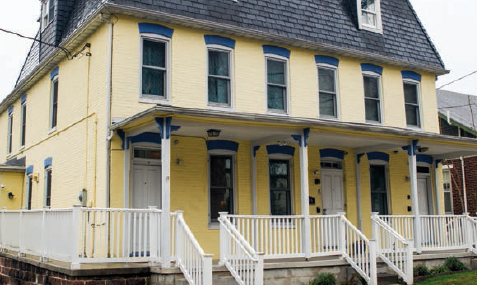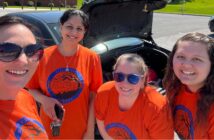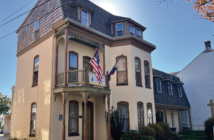Survivors, Inc. Shines a Light on Domestic Abuse, Sexual Assault, and Human Trafficking
By Karen Hendricks | Photography by Casey Martin
This article’s content may be emotionally disturbing for some readers. However, it is our intent to share facts and true stories associated with domestic violence, sexual assault, and human trafficking to increase community awareness. We encourage anyone recognizing the signs of domestic violence, sexual assault, or human trafficking in their own lives or the lives of their loved ones to contact Survivors, Inc.
“I know I’m intelligent, but I feel very stupid,” says Melissa*, her voice shaking at times, but strong enough to tell her personal story through an audio recording.
“I was the breadwinner, but now I have nothing; he made me leave my job…I wasn’t allowed to have a car. I would get out of the house maybe once a month to do grocery shopping. The kids and I were constantly on eggshells…it was depressing. So many times he would use all the money, and we went without basic needs. It turned into verbal and physical abuse.”
Four times, Melissa left her husband, taking their two children, but returned. “I just wanted to be normal and have a normal family.” Today, Melissa is finding her way back to “normal,” as a survivor of domestic abuse who found refuge and strength in Survivors, Inc.
The nonprofit organization is dedicated to shining a light on what many consider to be dark subjects. That’s why they invited Celebrate Gettysburg for a “vision encounter”—a first-floor tour of their safe house, Claudia House, interspersed with statistics and stories like Melissa’s.
The yellow house, located in downtown Gettysburg, shines like a ray of sunlight and hope for about 900 people who stay there every year, fleeing situations of domestic abuse, sexual assault, or human trafficking. On any given night, about 40 people—women, men, and children—take refuge in the 10 bedrooms of Claudia House on South Stratton Street. “We have never had an empty night,” says Terri Hamrick, Survivors’ president/CEO.
“I Found My Passion and a Way to Help People”
Vision Encounters are periodically arranged for community members, to spread awareness and knowledge beyond the yellow house. They bring these subjects out of the shadows and into the light of day.
“We moved to a public model because best practice found it was actually safer with more people knowing where the shelter is located,” says Nicole Mehring, Survivors’ community education specialist. Claudia House is equipped with security cameras and call buttons. The Gettysburg Borough Police Station is within sight, and there’s a good relationship with neighbors.
“As a community, we want to make sure we are positioning ourselves to help people recognize domestic violence, sexual assault, and human trafficking,” says Hamrick, who has served 10 years as Survivors’ president/CEO. Her career path was deeply affected by a “pivotal moment in college,” 28 years ago.
Hamrick, originally pursuing a medical career, interned at a rape crisis center after her college roommate was gang-raped at a frat party and shamed into recanting her story. Hamrick went on to serve as a domestic violence advocate for a local shelter the following semester. “I found my passion and a way to help people,” Hamrick says.
Today, she works with a 12-member board and a staff of 23 part- and full-time skilled professionals providing a growing list of services: a 24-hour hotline, emergency shelter, case management, support groups, and legal services—all free, confidential, and available to the public. Survivors’ annual budget, funded by state and local sources plus donations, has swelled over $900,000. The organization, founded in 1982, now serves about 1,400 people through 10,000 hours of services annually.
“We know that for every person we serve, 10 to 25 individuals have not
yet accessed services,” Hamrick says. It’s a tall task for an organization
whose vision statement is “An end to domestic violence, sexual assault, and human trafficking.”
“Her Tattoos Were Not Out of Love, But to ‘Brand Her’”
Mehring led us into Claudia House’s kitchen, “the heart of a home,” where meals are prepared and life skills are often taught to those who have led lives on the run. “We are just beginning to scratch the surface of understanding human trafficking and the fact that it’s in our community,” Mehring says.
Olga Nynäs, a client service specialist for Survivors, continues. “We received a call from Gettysburg Hospital recently, about a woman named Tracy*, a 24-year old, American-born woman. The nurses described injuries from multiple assaults including strangulation and said she had been pushed out of a truck by her significant other.”
“Due to her years of physical trauma, she looked much older than 24,” Nynäs says. Tracy received emergency housing, counseling, and joined a support group through Survivors. Slowly, details of her life began to emerge. She had been on the road since the age of 15, fleeing a home where her father and brother sexually assaulted her and prostituted her “to make ends meet.”
Tracy had several tattoos with the name of her significant other, a truck driver. “We helped her realize that her tattoos were not out of love, but to ‘brand her’ to her trafficker,” whom she considered her significant other. Survivors also taught her life skills, such as how to cook.
As Tracy healed, she made the decision to go back on the road with her trafficker. “She told us the weeks she spent with Survivors were the most peaceful in her life,” Nynäs says. “We taught her to be aware of where she was traveling, and if she felt unsafe to seek help at a public place such as a rest stop. We hope that we planted seeds with her, for her to take on her journey.”
It’s an outcome that Survivors’ staff often sees. Resolution and happy endings are not always the norm; clients—armed with knowledge and skills—can only make life changes when they are ready.
“I Made It to the Other Side”
The vision encounter moves from room to room in Claudia House, and a final and compelling story is told, via Melissa’s audio recording.
“I met my husband when I was 19, and he was 29,” Melissa begins, her voice filling the room. “I trusted his decisions. Everything moved quickly—I should have seen that was one of the signs…I realize how controlled my life was…The abuse got scary, and I realized the danger I was putting myself and my children in.”
The call she placed to Survivors was literally a lifeline, helping Melissa and her children leave an abusive home. “I made it to the other side. All the counseling is helpful…I’m in the process of healing. I was living in such a fog I didn’t know where to start.”
“I like it here in Gettysburg…We are moving into an apartment, and I’m so excited. I’m starting to look for a job. I want to give my kids some stability…I want to give my kids what they should have had all along. I know Survivors is here walking with me.”
How You Can Help Survivors, Inc.
Survivors accepts charitable donations via PayPal online. Volunteers are welcome and training is provided. Survivors also accepts gifts from their wish list. Survivors asks that all items be new and unopened. These include:
- Ethnic hair care and personal care products
- Sensitive skin and hypo-allergenic personal care and hair products
- Personal care and hair products
- Paper products such as toilet paper, paper towels, disinfecting wipes, diapers, facial tissue, and the like
- Kitchen sized trash bags and contractor bags
- Cleaning supplies like dishwasher detergent, dish soap, etc.
- Nonperishable food items that are not expired
- New pillows and twin sheet sets
- Gift cards for Giant, Kennies, Walmart, and Sheetz
Warning Signs of Domestic Violence and Sexual Assault
- Person tries to minimize injuries
- Injuries are inconsistent with the explanation
- Injuries are in various stages of healing
- Injuries to places that people cannot see
- Person is evasive and/or fearful around partner
- Stress-related physical symptoms
- Emotional disorders
- Frequently delays seeking care and/or repeated visits
- Repeated pregnancy testing
- Multiple pregnancies or abortions
- Consistently not using contraceptives
- Multiple emergency contraception uses
Learn More
Survivors’ Hotline:
717-334-9777 or 1-800-787-8106
Administrative Office:
717-334-0589
Website:
enddvsa.org
Social Media:
Facebook, Twitter, Pinterest, Instagram, and WordPress
*Clients’ names have been changed to protect their privacy




